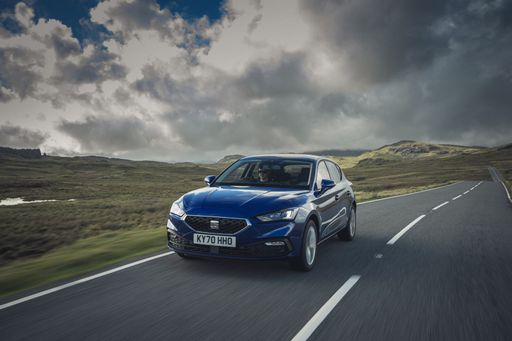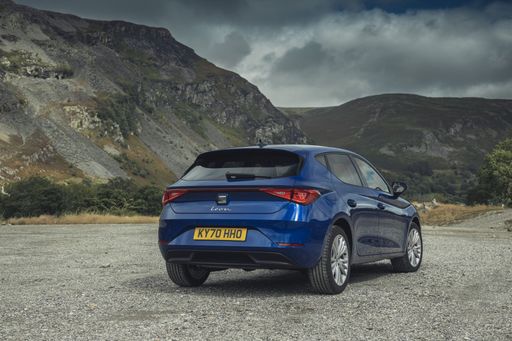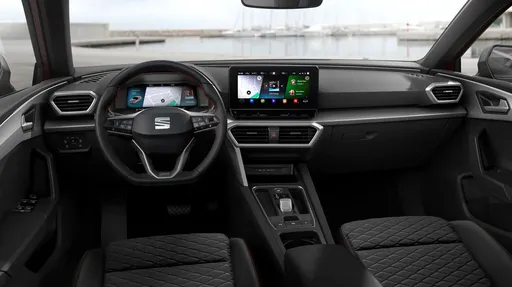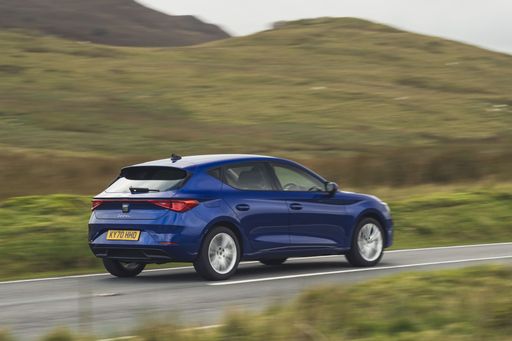Hyundai i20 vs SEAT Leon - Differences and prices compared
Compare performance (90 HP vs 272 HP), boot space and price (18600 £ vs 24500 £ ) at a glance. Find out which car is the better choice for you – Hyundai i20 or SEAT Leon?
Costs and Efficiency:
Price and efficiency are often the first things buyers look at. Here it becomes clear which model has the long-term edge – whether at the pump, the plug, or in purchase price.
Hyundai i20 has a distinct advantage in terms of price – it starts at 18600 £ , while the SEAT Leon costs 24500 £ . That’s a price difference of around 5854 £.
Fuel consumption also shows a difference: SEAT Leon manages with 1.20 L and is therefore decisively more efficient than the Hyundai i20 with 5.70 L. The difference is about 4.50 L per 100 km.
Engine and Performance:
Power, torque and acceleration say a lot about how a car feels on the road. This is where you see which model delivers more driving dynamics.
When it comes to engine power, the SEAT Leon has a decisively edge – offering 272 HP compared to 90 HP. That’s roughly 182 HP more horsepower.
In acceleration from 0 to 100 km/h, the SEAT Leon is decisively quicker – completing the sprint in 7.70 s, while the Hyundai i20 takes 11.50 s. That’s about 3.80 s faster.
There’s also a difference in torque: SEAT Leon pulls clearly stronger with 360 Nm compared to 172 Nm. That’s about 188 Nm difference.
Space and Everyday Use:
Beyond pure performance, interior space and usability matter most in daily life. This is where you see which car is more practical and versatile.
Both vehicles offer seating for 5 people.
In curb weight, Hyundai i20 is a bit lighter – 1145 kg compared to 1344 kg. The difference is around 199 kg.
In terms of boot space, the SEAT Leon offers barely noticeable more room – 380 L compared to 352 L. That’s a difference of about 28 L.
When it comes to payload, SEAT Leon to a small extent takes the win – 521 kg compared to 465 kg. That’s a difference of about 56 kg.
Who wins the race in the data check?
The SEAT Leon holds a decisive overall lead in the objective data comparison.
This result only shows which model scores more points on paper – not which of the two cars feels right for you.
Costs and Consumption
View detailed analysis
Engine and Performance
View detailed analysis
Dimensions and Body
View detailed analysis

SEAT Leon
Hyundai i20
The Hyundai i20 is a cheeky small car that mixes smart styling with sensible practicality, feeling more polished and roomy than you might expect for the money. It’s an easy car to live with, offering engaging handling, a comfy cabin and useful equipment that make daily commutes and weekend errands notably less dull.
details




SEAT Leon
SEAT Leon pairs sharp, modern styling with a cabin that's sensible and slightly sporty, making it an appealing choice for buyers who want flair without fuss. It drives with eager composure and offers a neat balance of comfort and agility, so you get everyday usability with a wink of fun.
details



Costs and Consumption |
|
|---|---|
|
Price
18600 - 24000 £
|
Price
24500 - 36400 £
|
|
Consumption L/100km
5.70 L
|
Consumption L/100km
1.2 - 5.5 L
|
|
Consumption kWh/100km
-
|
Consumption kWh/100km
-
|
|
Electric Range
-
|
Electric Range
133 km
|
|
Battery Capacity
-
|
Battery Capacity
19.70 kWh
|
|
co2
128 - 129 g/km
|
co2
27 - 126 g/km
|
|
Fuel tank capacity
-
|
Fuel tank capacity
40 - 45 L
|
Dimensions and Body |
|
|---|---|
|
Body Type
Hatchback
|
Body Type
Hatchback
|
|
Seats
5
|
Seats
5
|
|
Doors
-
|
Doors
5
|
|
Curb weight
1145 - 1170 kg
|
Curb weight
1344 - 1657 kg
|
|
Trunk capacity
352 L
|
Trunk capacity
270 - 380 L
|
|
Length
-
|
Length
4368 mm
|
|
Width
1775 mm
|
Width
1799 mm
|
|
Height
-
|
Height
1442 - 1460 mm
|
|
Max trunk capacity
-
|
Max trunk capacity
1187 - 1301 L
|
|
Payload
455 - 465 kg
|
Payload
473 - 521 kg
|
Engine and Performance |
|
|---|---|
|
Engine Type
Petrol
|
Engine Type
Petrol, Petrol MHEV, Diesel, Plugin Hybrid
|
|
Transmission
Manuel, Automatic
|
Transmission
Manuel, Automatic
|
|
Transmission Detail
Manual Gearbox, Dual-Clutch Automatic
|
Transmission Detail
Manual Gearbox, Dual-Clutch Automatic
|
|
Drive Type
Front-Wheel Drive
|
Drive Type
Front-Wheel Drive
|
|
Power HP
90 HP
|
Power HP
116 - 272 HP
|
|
Acceleration 0-100km/h
11.5 - 12.8 s
|
Acceleration 0-100km/h
7.7 - 10.5 s
|
|
Max Speed
-
|
Max Speed
197 - 220 km/h
|
|
Torque
172 Nm
|
Torque
220 - 360 Nm
|
|
Number of Cylinders
3
|
Number of Cylinders
4
|
|
Power kW
66 kW
|
Power kW
85 - 200 kW
|
|
Engine capacity
998 cm3
|
Engine capacity
1498 - 1968 cm3
|
General |
|
|---|---|
|
Model Year
2025
|
Model Year
2024 - 2025
|
|
CO2 Efficiency Class
D
|
CO2 Efficiency Class
D, B
|
|
Brand
Hyundai
|
Brand
SEAT
|
What drivetrain options does the Hyundai i20 have?
The Hyundai i20 is offered with Front-Wheel Drive.




